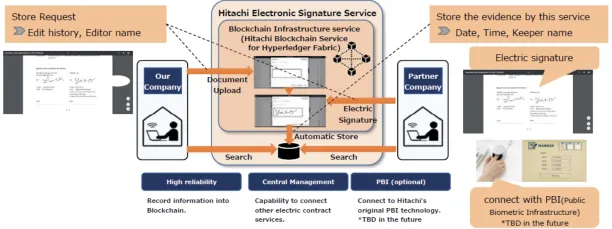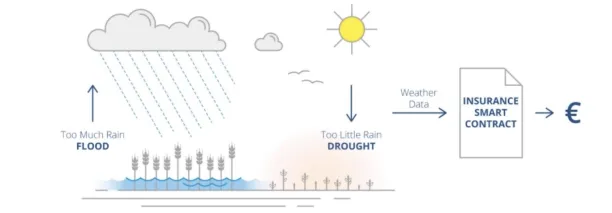A recent forecast projects the blockchain market will reach 943 billion U.S. dollars by 2032, growing at a CAGR of 56%.1 While the potential is massive, executives face uncertainty due to the varying maturity of blockchain solutions across industries.
Blockchain can improve multi-party processes through enhanced transparency, faster transactions, and lower costs—but not all applications are equally viable.
Check out 12 real-world blockchain case studies to help executives identify mature and high-impact investment opportunities.
Procurement blockchain case studies
1. Blockchain secures digital contracts and transactions: Hitachi
Business challenge:
Hitachi faced inefficiencies and security concerns in its procurement processes, which involved managing contracts with approximately 3,500 companies. The traditional paper-based system was time-consuming and prone to errors.
Initiative:
Hitachi implemented a blockchain-based, paperless procurement solution using Hyperledger Fabric. This system aimed to streamline contract management and enhance security.
Result:
The new system enabled Hitachi to handle at least one contract case per company per month, improving efficiency and reducing the risk of fraud.

Figure 1: Hitachi Electronic Signature Service workflow.2
2. Blockchain ease supplier master data management: Trust Your Supplier
Business challenge:
Trust Your Supplier identified a significant opportunity to reduce both the cost and effort involved in finding and onboarding reputable suppliers. Businesses often face two major risks in this area: disruptions in the supply chain and the need to meet quality standards, which are increasingly tied to regulatory requirements and stakeholder expectations around environmental and social responsibility.
The process of identifying suitable suppliers is typically time-consuming and costly. One of the main hurdles is the difficulty of verifying and obtaining accurate data from suppliers—especially since many companies are hesitant to share their data openly.
Initiative:
To address these challenges, Trust Your Supplier3 partnered with IBM to develop an open-source blockchain platform that enables secure and efficient data sharing between businesses and permissioned partners.
This platform allows supplier data to be validated by trusted third-party verifiers, such as:
- Dun & Bradstreet (for business information)
- EcoVadis (for ESG-related data)
- RapidRatings (for financial data)
Once verified, a blockchain-based corporate digital passport is created for the supplier. This passport facilitates:
- Improved compliance
- Enhanced risk management
- Shortened supplier onboarding times
Results:
- Reduced supplier onboarding duration by more than 70%
- Cut data verification costs by 50% when working with new suppliers
- Boosted compliance by enabling near-instant validation of international certifications, such as GRI, ISO, and SASB.
3. Blockchain eases trade finance: Marco Polo Network
Business challenge:
International trade presents significant risks for both exporters and importers. If an importer pays in advance, there is the possibility that the exporter may receive the cash without delivering the goods. On the other hand, if the exporter agrees to payment after delivery, the importer could potentially refuse to pay after receiving the shipment.
To manage these risks and support secure trade finance, companies often involve financial institutions and other parties, such as banks, which issue instruments like letters of credit. While these tools help ensure payment, they also introduce human error, delays, and added cost into the global supply chains—especially in industries that rely on high-volume cross-border transactions.
Initiative:
Marco Polo Network4 deployed a blockchain-based solution designed to modernize trade finance by reducing dependence on intermediaries and increasing transparency. Leveraging blockchain technology, the network integrates with supply chain ERP systems to enable data exchange between exporters and importers. It automates the creation of irrevocable smart contracts that enforce predefined terms—such as automatic payment once goods are confirmed as delivered—enhancing both trust and speed in trade.
By creating a shared audit trail and reducing reliance on manual documentation, this blockchain platform provides business value not only to trading partners but also to financial institutions and multiple parties that benefit from improved visibility and reduced complexity.
While the solution can operate independently of third parties, those organizations still benefit from the increased transparency and data integrity it delivers across the blockchain ecosystem.
Results:
- Enhances the working capital cycle for both buyer and seller through automated and secure settlements
- Automates the transaction settlement process via smart contracts, reducing manual errors
- Simplifies operations by digitizing trade documents and creating an immutable audit trail for better supply chain management
Supply chain blockchain case studies
4. Blockchain improves compliance: Renault
Business challenge:
The automotive sector is one of the most highly regulated industries. Renault, for instance, must comply with over 6,000 regulatory and quality standards across various dimensions, including:
- Safety regulations
- Geometric features
- Material quality
- Environmental requirements
To bring a vehicle to market, it must meet a wide range of internal and external compliance criteria. Regulatory changes must be communicated throughout the supply chain, reaching not only direct suppliers but also suppliers of suppliers. This complexity called for greater transparency and a system capable of managing compliance effectively across multiple parties.
Initiative:
To address this challenge, Renault5 partnered with IBM to develop the automotive industry’s first extended compliance, end-to-end distributed blockchain platform. This blockchain-based solution ensures full traceability of components and supports both internal and external compliance with regulatory standards. The platform improves supply chain visibility and creates a single source of truth, reducing the risks associated with fragmented or outdated compliance data.
Results:
- Cut non-compliance-related expenses by 50%
- Reduced the cost of managing non-quality and non-compliance issues by 10%
- Motivated Renault to expand the use of blockchain technology to track product carbon footprints and support recycling operations—reinforcing the company’s ESG goals and circular economy strategies.
5. Blockchain enhances raw material traceability: Ford
Business challenge:
To support the growing demand for electric vehicles, Ford needed to guarantee ethical sourcing of raw materials like cobalt—an industry challenged by environmental and human rights issues. The lack of end-to-end visibility in global mining and logistics posed major ESG compliance risks.
Initiative:
In partnership with IBM and RCS Global, Ford6 deployed a blockchain-based platform that tracks cobalt from certified mines through supply chain touchpoints to battery manufacturing. The solution integrates IoT data and supplier declarations to verify material provenance.
Results:
- Increased consumer trust in EV sustainability by offering verified sourcing trails.
- Achieved ESG compliance by linking suppliers with auditable data on ethical mining.
- Reduced risk of dealing with non-compliant or controversial raw material sources.
6. Blockchain authenticates infant products quality: Nestle
Business challenge:
In 2008, a food safety scandal involving melamine-contaminated powdered milk sickened over 300,000 newborns in China7 .This incident severely damaged public trust in infant nutrition products. As a result, Chinese parents became highly cautious about the quality and authenticity of baby food. Nestlé, aiming to successfully introduce its newborn nourishment product NAN A2 to the Chinese market, needed a way to restore trust and provide assurance about the product’s safety and quality.
Initiative:
To address this concern, Nestlé8 partnered with Techrock, a Chinese technology company, to develop a public blockchain platform integrated with a mobile application. This solution enabled parents to verify specific product details directly from their smartphones, including:
- Ingredients
- Source of the ingredients
- Production origin
- Packaging details, including photos
By offering easy access to detailed product information, Nestlé empowered consumers to make informed and confident choices.
Result:
Thanks to the transparency enabled by the blockchain solution, Nestlé gained significant consumer trust and achieved the largest market share in China’s infant nutrition sector.
Insurance blockchain case studies
7. Blockchain manages travel insurance payouts: AXA Fizzy
Business challenge:
AXA faced a common pain point in the insurance industry: delayed claim processing for flight delays. Customers were often frustrated by the paperwork and lag time in payouts. AXA sought to automate and improve customer experience.
Initiative:
AXA created Fizzy9 ,a blockchain-based parametric insurance product for flight delay coverage. Once a flight delay of more than 2 hours is detected via flight data oracles, a smart contract triggers automatic payouts to the insured—without any need for filing claims.
Results:
- No manual claims filing required—customers are paid automatically.
- Increased trust in AXA through transparent, data-based smart contracts.
- Enhanced customer retention by providing instant compensation.
8. Blockchain ensures instant claims processing: Etherisc
Business challenge:
Etherisc, an insurtech startup, aimed to significantly reduce the time required to process insurance claims. Traditional claims processing involves multiple steps—typically five—and often takes several weeks to complete, depending on the insurer and type of policy. The lengthy process creates delays for policyholders and adds administrative burdens for insurers.
Initiative:
To automate claims processing, Etherisc10 implemented a blockchain-based system that uses smart contracts. These smart contracts are designed to automatically execute and enforce agreement terms when specific conditions are met.
Etherisc also integrated third-party data providers to verify whether the conditions for a payout had been satisfied. Upon receiving an alert from the insured party, the system conducts a real-time evaluation of the initial claim investigation and policy verification, allowing for much faster decision-making.
Results:
- Significantly reduces the time required for claims settlement.
- Automatically detects potential fraud using trusted third-party data sources such as IoT devices or verified databases.

Figure 2: Claims processing with blockchain.11
Energy blockchain case studies
9. Decentralized energy trading via blockchain: Power Ledger & Google
Business challenge:
Power Ledger aimed to disrupt traditional centralized energy markets by enabling decentralized energy trading. In conventional systems, households with renewable energy installations (like solar panels) often had to sell their surplus power back to the grid at fixed, unattractive rates. There was limited transparency, slow settlement processes, and minimal flexibility for peer-to-peer transactions. This model limited the benefits for energy producers and consumers alike.
Initiative:
Power Ledger12 developed a blockchain-based platform to allow peer-to-peer (P2P) energy trading, enabling users to buy and sell energy directly. To support global scalability and performance, the company migrated to Google Cloud Platform (GCP), leveraging services such as:
- Google Kubernetes Engine (GKE) to run scalable containerized applications.
- BigQuery for advanced analytics on energy usage and transaction data.
- Cloud Pub/Sub and Cloud Storage for real-time messaging and secure data handling.
- Cloud Functions and Stackdriver for automated monitoring and debugging.
The blockchain layer, combined with Google Cloud’s computing power, facilitated secure, efficient, and transparent energy trading between individuals and businesses.
Results:
- Scalability: GCP allowed Power Ledger to scale across continents, supporting deployments in Australia, the U.S., India, Japan, and more.
- Real-time Insights: Users gained access to real-time data on energy consumption, generation, and trading activity through Power Ledger’s intuitive interface.
- Operational Efficiency: Automated cloud services and monitoring tools helped reduce manual workloads and enhance the reliability of trading operations.
- Sustainability: Enabled broader adoption of renewable energy by rewarding prosumers and encouraging localized energy markets.
10. Blockchain optimizes the power grid: Tennet
Business challenge:
TenneT, an energy transmission operator serving the Netherlands and Germany, faced significant challenges in balancing electricity demand and supply. The variable nature of sustainable energy production—particularly from sources like wind—makes electricity distribution complex and unpredictable.
Wind turbine output, for instance, fluctuates based on daily weather conditions. Similarly, electricity demand shifts throughout the day. This variability creates difficulties in ensuring consistent and efficient power distribution, leading to the need for advanced solutions to manage the grid dynamically.
Initiative:
To address this issue, TenneT13 partnered with IBM and Sonnen. IBM implemented a blockchain-based system, while Sonnen—manufacturer of home energy storage units—enabled real-time interaction with smaller-scale energy producers and consumers.
These energy storage units were connected to TenneT’s grid database via blockchain. Using the distributed ledger, discrepancies in energy supply and demand were shared transparently with stakeholders. This enabled the storage systems to quickly charge or discharge electricity, depending on the needs of the grid, effectively reducing inefficiencies in transmission.
Results:
- Eliminated the need for curtailment and complex re-routing operations, saving millions of dollars.
- Marked a major advancement toward integrating renewable energy, by offering a solution to manage its inherent supply volatility.
- Empowered local energy producers, such as homeowners and farmers with solar or wind systems, to reduce electricity costs and lower their carbon footprint.
Legal blockchain case studies
11. Blockchain transforms smart legal agreements: OpenLaw
Business challenge:
Law firms and clients often face delays and overhead from manual legal contract creation, negotiation, and execution. There was a clear need for secure, automated solutions that reduce friction without compromising legal validity.
Initiative:
OpenLaw14 launched a smart contract platform that integrates blockchain with legal text templates. Lawyers and clients could collaboratively draft contracts embedded with executable code, enabling automatic execution of key terms such as payments, IP transfers, or delivery milestones.
Results:
- Accelerated contract lifecycle by eliminating back-and-forth document revisions.
- Reduced legal costs through partial automation of routine clauses.
- Enhanced auditability and tamper-proof legal records stored on-chain.
12. Blockchain assists the tracking of intellectual property (IP): IPwe
Business challenge:
Many businesses do not have the opportunity to present the true value of their assets to potential investors, so some companies are undervalued.
IPwe intended to transform the inefficient old IP system, in which patent holders, lawyers, corporations, intermediaries, and global patent offices lack effective communication for various reasons, including the inability to transfer information from one source to another in a transparent manner.
Initiative:
IPwe15 teamed up with IBM to create a blockchain that allows IP to be tokenized and stored in the cloud. As a result, traders have easy access to IP and can invest in it based on clear data. IPwe also provides a place for businesses to fairly advertise their intellectual property.
Result:
IPwe’s blockchain database holds 80% of the world’s patents.
External Links
- 1. Blockchain technology market size worldwide 2032| Statista. Statista
- 2. Hitachi Streamlines and Secures Procurement with Hyperledger Fabric. The Linux Foundation
- 3. Home - Trust Your Supplier. Trust Your Supplier
- 4. Marco Polo Network | IBM.
- 5. A new blockchain solution for the certification of vehicle compliance at European level will be implemented. Renault Group
- 6. Ford Motor Company Launches Blockchain Pilot On IBM Platform To Ensure Ethical Sourcing Of Cobalt.
- 7. China dairy products found tainted with melamine - BBC News. BBC News
- 8. Techrock brings Nestlé NAN products to China. | by | Techrock | | Medium. Medium
- 9. AXA launches Fizzy: the first automated insurance payout scheme - The Futures Centre. Forum for the Future
- 10. Etherisc | Make Insurance Fair and Accessible.
- 11. https://uploads-ssl.webflow.com/6243075ff83d08a79dc7b307/624edb8ad39af33432e9c472_what_is_etherisc_1.0_en.pdf
- 12. Power Ledger Case Study | Google Cloud.
- 13. https://www.tennet.eu/tinyurl-storage/detail/europes-first-blockchain-project-to-stabilize-the-power-grid-launches-tennet-and-sonnen-expect-res/
- 14. https://www.openlaw.io/
- 15. IPwe | IBM.


Comments
Your email address will not be published. All fields are required.